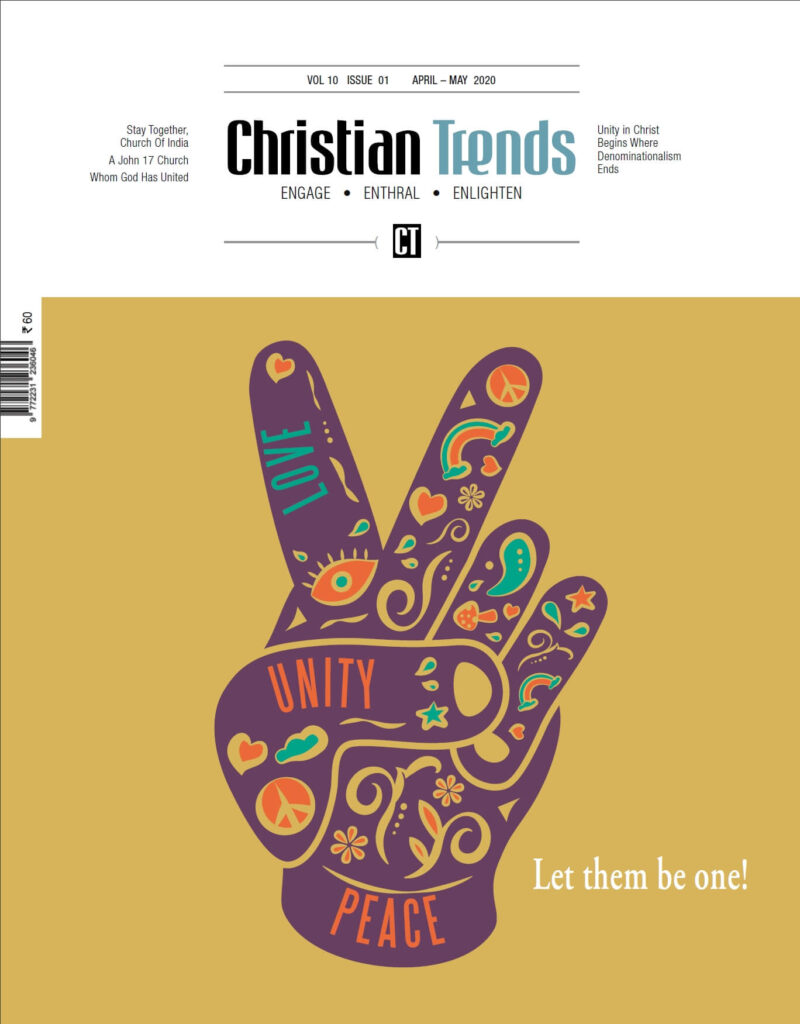One of the root causes of denominational apartheid is institutionalised expression of Christian faith. It demands a believer to be loyal to a particular form of Christianity than the ‘faith’ itself. It has to be noted that denominational consciousness is more among the clergy than the laity. Perhaps, denominationalism is needed for the survival of structures which bestow the clergy privilege and authority.
Christian faith demands qualitative life and witness in society. Quality is measured in terms of outlook and action informed by the teachings of Jesus Christ. Today, qualitative faith-life has been compromised in various spheres of social life. One of the areas where Christians in India fail to live up to the calling of Jesus Christ is unity among them (John 17: 20–26). Unfortunately, they continue to remain as ‘divided house’ vis-à-vis community life, doctrinal position, social involvement, outlook and missional activities. Even some denominations/churches behave like ‘caste groups.’ They maintain exclusivist attitude with regard to social (matrimonial) and ministerial relations. They willfully close the doors of dialogue and common witness. Sadly, Christian identity is also replaced by denominational identity. Instead of identifying as ‘Christian’ we are ‘proud’ to say that ‘I am Pentecostal, Evangelical, Orthodox, Charismatic, Protestant, Catholic, Lutheran, Baptist….’ These categories are again qualified by regional, linguistic and ethnic identities. This division actually contradicts the idea of Christian community as Body of Christ. B.R. Ambedkar articulated the division within Christianity long back in this way, “The Indian Christian is a disjointed—it is a better word than the word disunited—community…Indian Christians like all other Indians are divided by race, by language and by caste…their religion which is their only cement is infected with denominational differences. The result is that the Indian Christians are too disjointed to have a common aim, to have common mind and to put a common endeavour” (Dr Babasaheb Ambedkar: Writings and Speeches Vol 5, 476). One of the main causes of disjointedness is denominationalism. No community in India (exemptions are respected) can grow if it does not have ‘common aim, mind and endeavour.’ We talk about unity (ecumenism), but secretly promote exclusivism even in ecumenical forums. Is it possible to think and act beyond denominationalism?
We talk about unity (ecumenism), but secretly promote exclusivism even in ecumenical forums. Is it possible to think and act beyond denominationalism?
The need and nature of Christian unity have to be understood in the light of contextual realities, particularly the challenges faced by the Christians in society. They continue to experience various forms of victimisation, particularly caused by communal polarisation and subsequent violence. Though the constitution guarantees religious rights, notably ‘the right to profess, practice and propagate the religion’ Christians in many states experience its violation by the fringe elements/groups that spew venom of hatred against the minorities and perpetuate unlawful activities against them. The Christians are often attacked on the pretext of religious conversion. In many places, priests and community workers are arrested on the grounds of the false allegations of inducing conversions. Irrespective of denominations, worship places have been vandalised or forcefully closed down. The Freedom of Religion Act (different versions) passed in some states is mainly aimed to target Christianity which attracts the people, particularly those who are in the lower strata of society. The Christian educational and service institutions face undue administrative interference of the government. They also face the encroachment of their properties by politically influential individuals or groups. Moreover, the social atmosphere is now awfully conditioned by majoritarian religious sentiments. Everything is looked at through the eyes of religion. Even if voice is raised against injustice or corruption, who raises it matters a lot today. The victims of such approach are religious minorities, majority of them are socially and economically poor and politically powerless. These realities are the signs of the times which demand commitment and action towards the unity of Christians beyond denominations. The context warns us that disunity, perpetuated by the spirit of denominationalism, must be overcome by the consciousness of one body, one faith and one Lord. Unity is biblical virtue and mandate, and necessary for the witnessing community in India.
The contextual realities locate the unity of Christians within the framework of Christian witness. Life in unity is embodied in every act of following Jesus. A divided faith community actually questions the unifying power of respective faith. Therefore, as body of Christ, Christians are called to exhibit unity in faith praxis, particularly in responding to the issues within and outside the faith communities. In the words of Gustavo Gutierrez, “To be a Christianis to accept and to live-in solidarity…” Though it is risky and challenging, this experience breaks the walls of denominationalism and generates the power of unity that brings changes in society. In the context of rigid denominationalism which kills the spirit of Christian community, an attempt can be made to build up a convergence of Christian denominational communities for common witness (cause) in respective context. It is not a ‘doctrinal’ or ‘structural’ convergence but a convergence on common agenda to make Christian community a model for just and humane community. It will help the Christians to have collective thinking and initiate life-affirming actions beyond denominations to live out the Gospel of Jesus.
While uniting for their concerns, Christians should join hands with other communities or civil societies, and more importantly stand with the victims of caste and religious conflicts. Christian unity is incomplete if they ignore the pain of others.
This convergence is programme-centric unity or solidarity than organic unity/solidarity. Denominations are not going to be dissolved into one entity. While maintaining individual identity the denominations can unite on programme level and respond to the issues of Christian community and the society at large. A consciousness of one body, though spread in different denominations, can bring Christians together to protect their rights in this land. For instance, Christians should stop presenting the common issues related to the Christian community, such as Christian Personal Law, denial of the equal rights of Dalit Christians, violation of the educational rights of minorities and the question of increasing atrocities on Christians as issues of a denomination or section. They must be treated as issues of whole Christian community. The ruling class, who belong to the majority religion may not even understand denominational differences, may ignore any issue if they come to know that particular issue is raised by one of the denominations among the Christians. A divided bargaining does not produce any result. If there is a united action in presenting the issues of Christian community, it will automatically reflect in the approach of administration. It can at least reduce the negative ramifications of the policies and programmes concerning the rights of minorities. While uniting for their concerns, Christians should join hands with other communities or civil societies, and more importantly stand with the victims of caste and religious conflicts. Christian unity is incomplete if they ignore the pain of others. As Jesus expressed His solidarity with the marginalised of His time, so His followers should unite for the cause of the deprived in society. The unity of Christians should not be a tool in electoral politics. It must be ‘political’ in terms of taking side with justice, peace and equality. It should raise voice not only for Christians but also for the common good of all citizens.
The power of denominationalism is such that majority Christians are denominationally conditioned to think, act and behave in relation to fellow Christians. If you identify yourself as a Christian, most probably, a non-Christian may not ask your denomination. She or he will be satisfied with your Christian identity. However, if the other person happens to be a fellow Christian, she or he will definitely ask your denomination and, sometimes, may not continue the interaction if you do not belong to his or her denomination or one that comes closer to it. Like caste discrimination, denominational discrimination is a fact among Indian Christians. For instance, in India there are theological institutions which claim that they are ‘ecumenical.’ If there is any vacancy for faculty/staff position, the advertisement for the same appears to be neutral or innocent in terms of denominational membership. However, selection and promotion to the higher positions are defined by where you belong to. Not your Christian identity but denominational identity matters! There are denominations which prefer non-Christians to the Christians of other denominations as employees in their institutions or projects. It does not mean that non-Christians must not be appointed, but membership in particular denomination becomes an obstacle for many Christians to get opportunities in Christian organisations. One of the root causes of denominational apartheid is institutionalised expression of Christian faith. It demands a believer to be loyal to a particular form of Christianity than the ‘faith’ itself. It has to be noted that denominational consciousness is more among the clergy than the laity. Perhaps, denominationalism is needed for the survival of structures which bestow the clergy privilege and authority.
Yet, a genuine unity is evident among the believers than the clergy. While clergy level unity is often formal and sometimes a ‘stage show’, common believers have no problem to worship and work together unless they are ‘banned’ by the denominational authorities. They know the pain of standing divided, particularly in the locations where they are minority. Still denominationalism is injected into the minds of simple folk. It is often perpetuated with political and economic interests also. For example, if Christians are majority in a particular electoral constituency, the candidate, who belongs to the denomination having less membership, may not win the election. Here, not Christian identity but denomination works.
Is there any way out? It is a matter of fact that denominationalism has already crept into Christian community, and badly damaged the image of Christianity in our time. Therefore, the future of Christianity in India does not lie in the hands of denominations but the Christians who think beyond denominations and uphold the values of Christian faith. While denominations perpetuate sectarianism, faith-praxis beyond denominations makes the Christian faith more meaningful in a context. A witnessing community requires a journey beyond denominations and touch the lives of people in society. Denominations domesticate the faith and block its renewing power. It does not mean that denominations should be dissolved in no time (impossible). But they should be transformed into faith communities which actualise the faith beyond their established boundaries and facilitate the unity of believers. A genuine consciousness of being Christian enables a person to act beyond denomination. Denominational consciousness is practically the same as caste consciousness. Being Christian means being united with Christ, not denominations. A Christian is subjected to none, but to Christ who prayed that his followers ‘may all be one’. Therefore, a Christian can think, act and experience faith beyond denomination. The biblical unity is not denominational unity in nature and purpose, but unity of believers in Christ.






